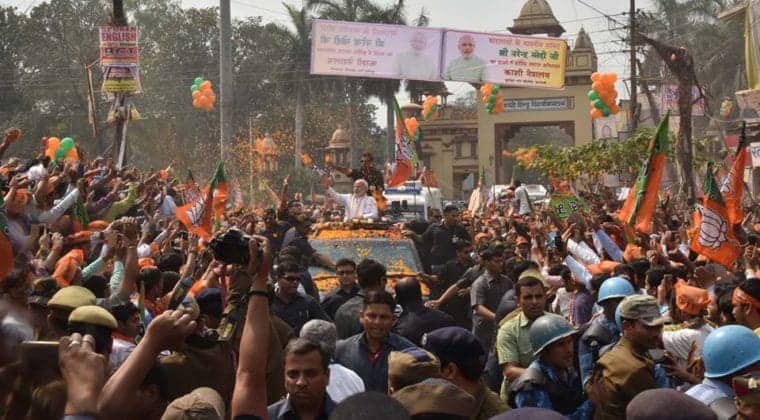Modi’s BJP continue ascendancy after key state elections
UKIBC CEO, Richard Heald gives his take on the results from India’s state elections

Prime Minister celebrates victory in the State Elections. Image credit: Narendra Modi/Flickr
The people have spoken, with the results across the five state elections announced over the weekend.
The results in Uttar Pradesh, Uttarakhand, Manipur and Goa must give the BJP and, particularly, Prime Minister Modi significant cause for comfort. Only in Punjab was there cheer for Congress.
It is in Uttar Pradesh that the focus justly lies. The absolute BJP majority is a stunning result – some 325 seats out of a total of 403. The general consensus is that state elections are different from national elections. And, no more so than in Uttar Pradesh with its vibrant, diverse and engaged electorate of some 140 million people. So, achieving success, across the state, on this scale …… is remarkable. It means that the BJP’s message is transcending caste, religion and the urban/ agrarian divide at a local level.
What does this mean for business and investors in India? It means continuity and it also means change.
It means that the likelihood of BJP success – probably with their existing NDA partners – at the Union elections in 2019 is enhanced. It also means that Prime Minister Modi may feel emboldened to roll-out further reforms ahead of the 2019 elections in the knowledge that the electorate will acknowledge his efforts at the ballot box.
What might these reforms be and what are the business priorities?
- Top of the list should be the continued focus on the roll-out of GST. This is not a done-deal yet. Much good work has been done but much has to be done. A poor result in these elections would have seen the Centre’s attention diverted.
- Secondly, I would expect to see further measures to force financial transactions into the open, level the financial playing field and digitise transactions. In the recent Budget, Minister Jaitley indicated that tax collection from both direct and indirect sources has increased. Increasing the percentage of the population which is liable – and pays – is a critical path item in making the India economy fit for purpose to support its momentum to becoming a leading economic power.
- Renewed focus on Ease of Doing Business measures and in structural areas which enhance job creation such labour and land law reforms, as well as reforms of corporation tax regime. Indeed, why not use this time to grasp the festering sore that is retrospective taxation and, at a stroke, put India’s attractiveness onto a new plain.
- In London, recently, Minister Jaitley stressed the continued focus on the agricultural sector and the poor and although their economic impact continues to decrease they still have significant power at the ballot box. Re-packaging of existing benefits into a Universal Basic Income (UBI) has been touted. This measure would add to the cutting- out of corruption and the getting of economically important cash direct into beneficiaries bank accounts. At the same time and more broadly, the dusting off the Foreign Education Providers Bill would also have a significantly immediate impact on addressing voters’ aspirations.
There will be other state elections in 2018 before the 2019 Union Elections – Karnataka, Gujrat, Rajasthan and many North-Eastern states. So, Prime Minister Modi will be keen to maintain the winning momentum.
And, at the same time, while the UP result will affect the composition of the Rajya Sabha, it has to be remembered that the ruling NDA coalition only controls some 33% of the upper chamber. Yes, the UP result will deliver an addition 31 seats to the BJP (out of a total of 245), but the intricacies of the nominations to the upper house will only actually result in a net 10 seats by 2019.
Nonetheless, the current set of results will make Congress and other parties jittery about capricious opposition, benefitting to NDA as they plan for reforms into the Union elections, with the dominance of regional parties seen to be fading at some level.
And what of Congress and AAP, the two parties with significant national ambitions. Most of the “noise” will be on the results in Uttar Pradesh but there are conclusions which could be taken from these results:
- The Congress Party problems continue to mount. The party and Rahul Gandhi invested more in the UP election than in any other previous set of elections, and despite successes in Punjab and Goa, it is faced with the fact that it is still not a credible national opposition. It has just over 24 months to come up with answers. It needs to be radical – changing focus and messaging, and probably personalities.
- The AAP also failed and is now faced with an existential threat to its future. The party had ambitions to supplant Congress as the “main” Opposition party at the Centre. They have failed. No prizes go to people who come second. They are the incumbent in Delhi and with an increasingly disappointed electorate, the state elections in late 2018 will pose a real challenge. Indeed, it is entirely possible that AAP will enter the next Union election with no state power base.
Faced with such a positive result in UP and his opponents in such disarray coupled the likelihood of a less recalcitrant Rajya Sabha, Prime Minister Modi could be forgiven for relaxing a tad…
I doubt it though. Speaking in New Delhi on March 12, Prime Minister Modi make clear the scope of his ambitions, and they extend well beyond 2019. He spoke as a man who feels history’s hand on his shoulder.
Clearly, he intends that these results will cause him to redouble his efforts at “disruptive” reform and the first action we except is a reshuffle of his team…



